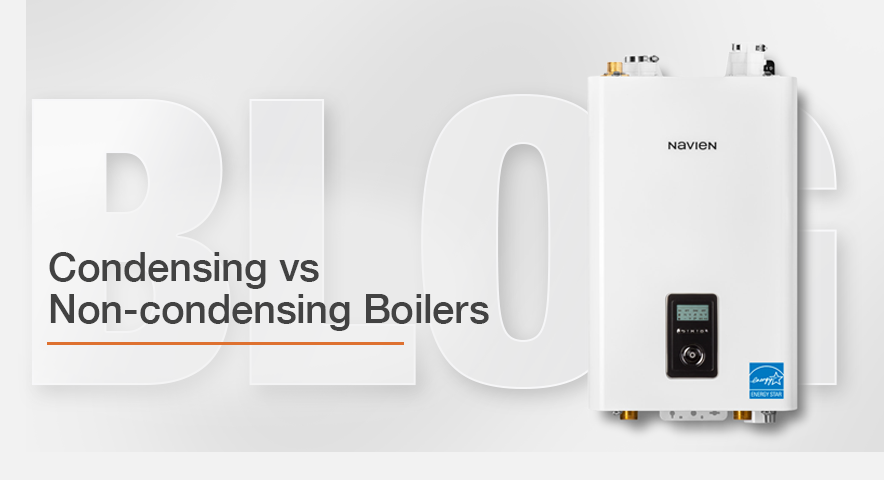If you’re considering a heating boiler for your home or business, you might wonder what the differences are between condensing and non-condensing models, and which type is best for your project. This article will summarize the key differences so you can feel confident choosing the right model.
Non-condensing boilers have been around longer than condensing boilers, which entered the market in the 1990s. Condensing boilers have more advanced technology, which leads to differences in operation, installation requirements and energy efficiency.
Condensing vs Non-Condensing Boilers: How They Work
Condensing and non-condensing gas heating boilers both use natural gas (or liquid propane) as a fuel source, and provide reliable hydronic heating (via radiators, baseboards, or radiant floor heating systems).
Non-condensing boilers (aka conventional or traditional boilers) are larger and heavier than condensing boilers, and are typically floor-standing. Non-condensing boilers burn gas to heat water which in turn heats your home. The combustion exhaust is extremely hot and must be directly vented via a chimney or flue.
Condensing boilers (aka high efficiency boilers) are smaller and lighter, and typically wall-mounted. Condensing boilers use a heat exchanger to capture and recycle heat from the exhaust gas before it’s vented. This makes the heating process more energy efficient, lowers the exhaust gas temperature, and creates condensation inside the unit that needs to be drained.
| Condensing Boilers | Non-Condensing Boilers | |
| Also called | high-efficiency boilers | traditional/conventional boilers |
| Size | smaller & lighter | larger & heavier |
| Installation | wall-mounted, drain required | floor-standing, no drain |
| Venting material | PVC, CPVC, PP, SS or type BH | chimney or flue |
| AFUE (annual fuel utilization efficiency) | up to 95% | up to 80% |
| Maintenance | yearly inspection & service | yearly inspection & service |
Installation Differences
Non-condensing boilers must be vented using a proper chimney or flue due to the extremely high temperatures of the exhaust gas. Condensing boilers have cooler exhaust gas (because the heat is recycled) and can be vented using a wider range of materials including PVC and polypropylene. In addition, Navien condensing boilers allow 2” venting up to 65’ and 3” venting up to 150 feet, giving you more installation location flexibility.
Condensing boilers require a drain line for the acidic condensate liquid, which could potentially limit installation locations. Non-condensing boilers don’t need a drain because the exhaust gas doesn’t condense inside the unit.
No matter what type of residential gas boiler you choose, installation costs can vary based on the home and boiler size, number of zones, and how much work needs to be done for gas piping and venting. Find an authorized Navien installer to get a quote for boiler installation.
Efficiency Differences
Condensing boilers consume less fuel than non-condensing boilers, which means lower gas utility bills and a smaller carbon footprint. Navien condensing gas boilers have an AFUE of up to 95% and are Energy Star certified.
In comparison, traditional boilers have an AFUE of up to 80%. This means that up to 80% of the fuel is used to heat your home, while up to 20% is lost through inefficiencies. Replacing an older non-condensing heating boiler with a Navien high-efficiency condensing boiler can significantly reduce your monthly home heating bills.
Maintenance & Lifespan
Both condensing and non-condensing boilers can have a service life of around 15-20 years. How long your heating boiler lasts depends on how well the boiler was installed, climate and usage patterns, and how well you keep up with recommended maintenance.
All residential boilers should be inspected and serviced annually by a professional. Both condensing and non-condensing boilers should have the heat exchanger flushed once a year or as determined by combustion efficiency.
If you live in a region with hard water, using a scale prevention system with your heating boiler can extend its service life by preventing damaging lime and calcium deposits.
Which Type of Boiler Is Better for Your Home?
To decide whether a condensing or non-condensing boiler is the best choice for your home, you’ll need to consider:
● Installation options
○ If you have an existing chimney or flue that can accommodate high-temperature exhaust, but you don’t have an install location with available drainage, then non-condensing makes the most sense for your application.
○ If you do have an installation location with available drainage, then you can benefit from a condensing boiler’s more efficient home heating in a smaller package.
● Energy efficiency
○ If you want lower utility bills and a smaller carbon footprint, a condensing boiler is the best choice.
● Domestic hot water
○ If you want one unit to provide both home heating and domestic hot water, you should consider a combi-boiler.
Learn More:
Navien residential condensing boilers
